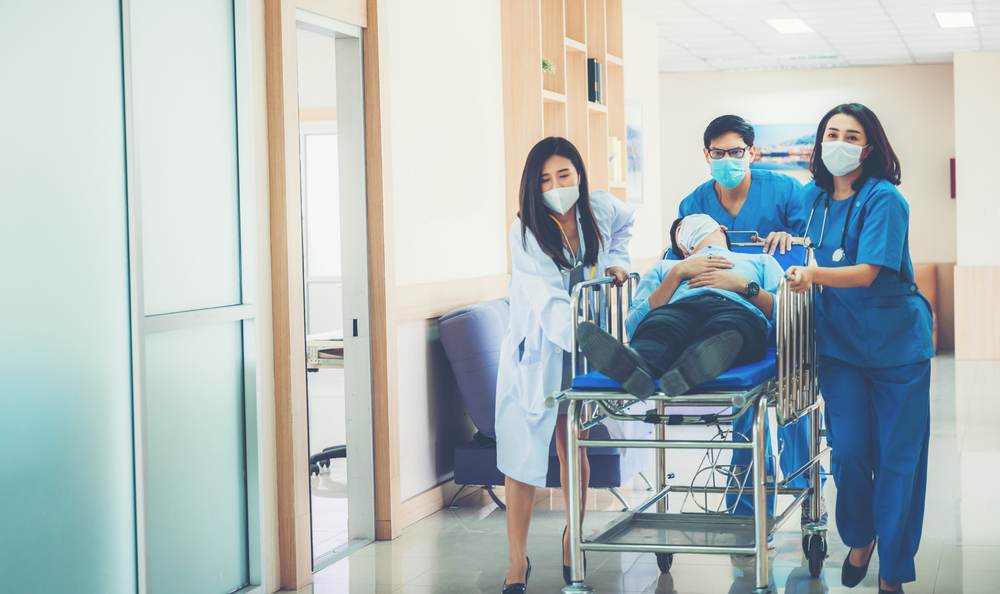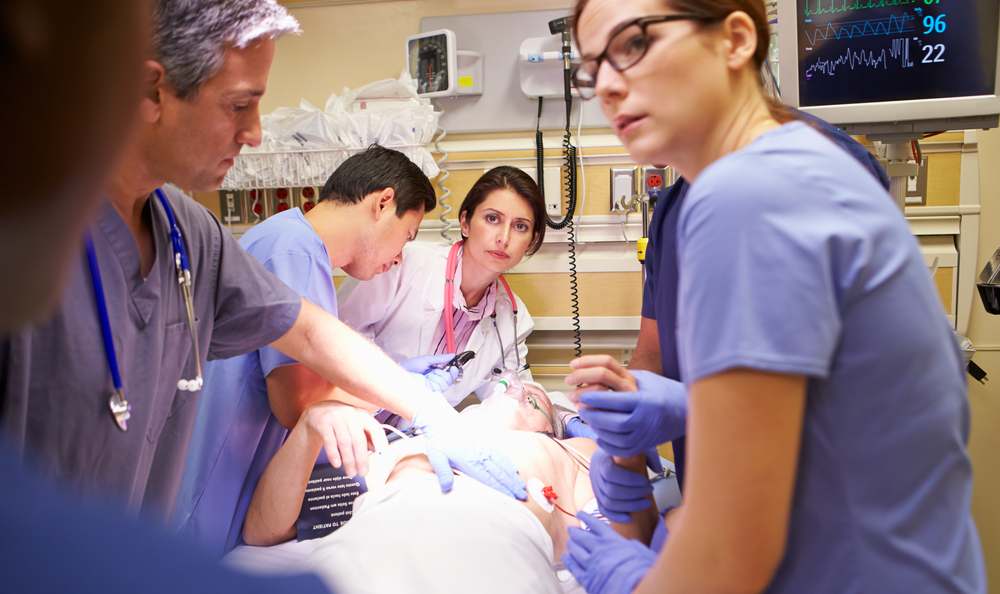 Car accident injuries are a leading cause of disability throughout the world, with roughly 50 million individuals experiencing serious injury as a result of a car accident each year. In the United States alone, 3.4 million people will seek care for injuries associated with a car accident each year, a rate of roughly 5.3 visits for every 1000 people. For the average person, the risk exists that they will not only be involved in a car accident at any time but that they will need to seek medical care following that event. For some, that may be for physical injuries; for others it may be for emotional injuries such as post-traumatic stress disorder (PTSD). Regardless, seeking specialty care can reduce the risk of long-term complications and help you get back to work and life faster.
Car accident injuries are a leading cause of disability throughout the world, with roughly 50 million individuals experiencing serious injury as a result of a car accident each year. In the United States alone, 3.4 million people will seek care for injuries associated with a car accident each year, a rate of roughly 5.3 visits for every 1000 people. For the average person, the risk exists that they will not only be involved in a car accident at any time but that they will need to seek medical care following that event. For some, that may be for physical injuries; for others it may be for emotional injuries such as post-traumatic stress disorder (PTSD). Regardless, seeking specialty care can reduce the risk of long-term complications and help you get back to work and life faster.
Why You Should Seek Medical Treatment
Seeking care after a car accident can be scary, with many people you don’t know around you and being in an unfamiliar setting such as a hospital. Still, it is imperative to seek medical attention as soon as possible after a car accident to avoid any long-term complications, such as a disability due to poor healing or PTSD due to a lack of appropriate therapy. Identifying which level of care you need, where to obtain it, and who can provide expertise can be hard. The doctors and staff at AICA Lithia Springs can help you in an office setting that includes imaging, therapeutic interventions, and more.
Levels of Care
Knowing what level of care to seek is always hard and is best left to a medical professional to determine. When in a car accident and experiencing any injury or discomfort at all, it is best to let yourself be examined by an emergency medical technician or paramedic on the scene. They can perform reasonable triage, apply necessary first aid and emergency care, and in cases of severe injury, they can stabilize and transport you to the right hospital. Not all hospitals are made the same, and in general, for serious injuries, it is best to go to a designated trauma center. Those hospitals have specialists in the building at all times to provide acute care and the physical resources to care for the most seriously injured individuals. Reaching a Trauma Center within the first hour after an injury is associated with improved outcomes.
Office Visit
It is not uncommon for someone to not have any pain or discomfort after a car accident but wake up the next morning sore and uncomfortable. This is particularly true for those with whiplash, which can take a day or two to present with pain in some cases. If you find yourself in pain in the days after a car accident, contact your primary care doctor or the specialists at AICA Lithia Springs for help in determining whether or not you can be seen in the office or if you need to seek a higher level of care.
Urgent Care
Urgent Care is an intermediate level of care between that of an emergency room and the doctor’s office. In most cases, they are capable of managing minor car accident injuries, like fractures, minor cuts and wounds, and mild burns. They generally have the ability to do x-rays, sutures, brace or splint a limb, and provide medical devices like crutches. However, they cannot do more advanced testing such as computed tomography (CT) scan or magnetic resonance imaging (MRI). They do not have the ability to provide care for serious injuries, so if injured and in doubt, it may be best to seek care in an emergency department. Again, it is best to contact your existing provider or use the nurse hotline with your insurance provider to help you determine which level of care is most appropriate.
Emergency Room
Emergency Room Care is where many car accident injuries are seen and treated due to their acute nature. It can be difficult for someone to accurately gauge how seriously they are injured following a car accident, so allowing medical professionals to examine you for injury is prudent. If seriously injured, Emergency Medical Services (EMS) will generally transport you to the Emergency Department at a Trauma Center. They have the ability to provide all levels of care needed.
Assessment
The first step in any care being provided in any setting is a thorough assessment of your health history, current medications, and present injuries. This may include physical exams, maneuvers to elicit responses that indicate injury, imaging such as CT and MRI, laboratory testing, and more. If your injuries are minor, much of this will be done in the doctor’s office as an outpatient. If injuries are serious, it will be done while in the emergency department right away.
Treatments for Car Accident Injuries
Medication
If you are admitted to the emergency department with a serious injury following a car accident, you will immediately be stabilized to the best ability of the staff possible. This generally includes medications for pain and possibly other things, such as blood pressure, given intravenously. More minor injuries may receive oral medications while they are being assessed. If there are cuts or breaks in the skin, antibiotics may be given. Pain medication may be necessary for use after discharge, depending on the type of injury involved. Your provider will select the safest medication that is still effective for your condition when pain relief is needed.
Medical Equipment
In many cases, car accident injuries involve bones and joints, which need to be braced, splinted, and supported after being hurt. Medical equipment such as crutches, scooters, wheelchairs, splints, braces, casts, and more should be provided by the office or hospital treating your injuries. In some situations, you may be given a splint and referred to a specialist, such as the orthopedic surgeons at AICA Lithia Springs. A splint often does not surround the limb entirely, allowing for swelling that occurs after a broken bone or another injury. The soft splint prevents that swelling from creating pressure that can lead to impaired blood flow in the limb. Once you see a specialist, they will determine which longer-term support is needed and what assistive devices you might require as a result. For those who are seriously injured, necessary equipment may include home health devices such as shower chairs, toilet supports, body lift devices, IV poles, tube feeding supplies, home oxygen, or even home ventilators.
Hospitalization
Those who experience serious car accident injuries will require hospitalization for acute care management. While they are inpatient, they will generally be seen by all necessary specialists to render appropriate care. Which specialists will see them depends on what injuries they have. Patients will usually have their pain, blood pressure, oxygen, fluids, and more regulated while they are in the hospital. These treatments are designed to keep a person stable while they heal enough to go home.
Surgery
 Bones that have broken in certain ways will often require surgery to set accurately and safely. Any soft tissue injury may require repair to reconnect torn parts. Organs may need suturing or removal if damaged. In most cases, surgery is done on an outpatient basis for relatively minor or moderate injuries to bone and joints. Still, in severe cases, emergency surgery may be needed to save a life due to car accident injuries.
Bones that have broken in certain ways will often require surgery to set accurately and safely. Any soft tissue injury may require repair to reconnect torn parts. Organs may need suturing or removal if damaged. In most cases, surgery is done on an outpatient basis for relatively minor or moderate injuries to bone and joints. Still, in severe cases, emergency surgery may be needed to save a life due to car accident injuries.
Rehabilitation
In the case of someone who has had a serious injury that requires hospitalization, they will usually become medically stable before they are fully capable of caring for themselves due to impaired mobility, pain, and weakness. In those cases, the patient will generally spend some time in a rehabilitation center where they can receive skilled nursing care without the more acute care of the inpatient hospital setting. This is a less formal setting, and the patient generally can wear their own clothing and have more personal belongings with them. They will be expected to participate in physical therapy daily and make continuous progress.
Continuing Care
Ideally, a person who has been harmed by car accident injuries can return home once they are mobile enough to care for themselves. In some cases, though, that is not possible. This is particularly true when a head or spinal cord injury has occurred. Those patients may need to have long-term care provided, whether in the home or in a skilled nursing facility. Some may find themselves able to maintain their home lives but unable to work or participate in other activities. They may require ongoing care to optimize their function and maintain their living situation. One predictive factor in whether or not someone will need continuing care and experience increased disability is the severity of pain at the time of the car accident. The more pain someone has at the time of the accident, the more likely they will be impaired long-term.
Physical Therapy
 Physical therapists are highly trained individuals who specialize in the restoration of function in the body using physical maneuvers that restore strength, range of motion, and functionality. Physical therapy may be used in car accident recovery at almost any stage and with any level of injury. For those with minor injuries being managed on an outpatient basis, they may find physical therapy helps ease pain from strained or sprained joints, regain strength in a weakened back, or increase the range of motion in a neck with whiplash. For those with serious injuries that are inpatient, physical therapy will often be the first people who will get you up and out of bed to stand and walk, keep muscles from atrophying, and restore function in an injured limb.
Physical therapists are highly trained individuals who specialize in the restoration of function in the body using physical maneuvers that restore strength, range of motion, and functionality. Physical therapy may be used in car accident recovery at almost any stage and with any level of injury. For those with minor injuries being managed on an outpatient basis, they may find physical therapy helps ease pain from strained or sprained joints, regain strength in a weakened back, or increase the range of motion in a neck with whiplash. For those with serious injuries that are inpatient, physical therapy will often be the first people who will get you up and out of bed to stand and walk, keep muscles from atrophying, and restore function in an injured limb.
Occupational Therapy
Occupational therapists use their specialized skills to help patients restore functions of daily living. This often includes rudimentary activities like getting dressed, bathing, eating, and toileting. While physical therapy works on the musculoskeletal system, occupational therapy works on connecting the brain, nerves, and muscles to create an action. This is particularly helpful when there are neurological injuries to the brain or peripheral nerves. They may provide you with assistive devices like utensils with larger handles that can be held easily or graspers that allow you to reach something far away. This kind of therapy is rarely needed for those with minor injuries and is often part of the long-term rehabilitation seen in skilled nursing facilities.
Psychological Therapy
Unfortunately, many people who are in a car accident experience psychological trauma as well as physical injuries. This may manifest as acute stress disorder or may persist into post-traumatic stress disorder (PTSD). Because PTSD can affect quality of living significantly, it is important to discuss any emotional or behavioral changes you experience with your providers so you can be referred to a mental health professional who can help you. There are effective treatment options for PTSD that can restore your health and well-being.
Car Accident Care at AICA Lithia Springs
Overall, treatment for car accident injuries depends entirely on the extent and type of injuries that have occurred. Seeking out the appropriate care after a car accident is critical. You can reach a skilled and knowledgeable car accident doctor at AICA Lithia Springs by contacting us now.
